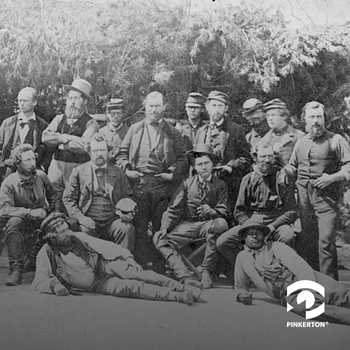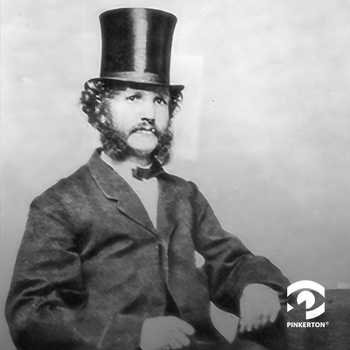Samuel M. Bridgeman’s life, marked by his roles as a sailor, soldier, detective, and scout, unfolds like a riveting action-adventure novel. His illustrious career in the United States military, law enforcement, and at Pinkerton’s National Detective Agency was part of a life filled with extraordinary experiences and adventures.
He was born in Fairfax, Virginia in 1818, and as a young man of incredible endurance and fitness in his early 20s, he enlisted in the U.S. Marine Corps and traveled the world for three years. In 1846, when the Mexican-American War erupted, Bridgeman departed from the Marine Corps and enlisted in the Third United States Cavalry's mounted rifle regiment. Throughout the war, he served as a sharpshooter. After sustaining a wound, his bravery earned him a promotion to the rank of sergeant.
After the Mexican-American War, he joined the ranks of the New York City Police Department and became acquainted with Allan Pinkerton, who was looking to increase his elite detective force in Chicago, along with George H. Bangs and William H. Scott.
A few years later when Allan Pinkerton was appointed the head of the Union Secret Service at the beginning of the Civil War in 1861, he invited a number of his operatives to join him. Although Bridgeman was born in Virginia, below the Mason-Dixon Line, he was loyal to the old flag. He had no hesitations about joining Pinkerton on the battlefield. His military experience served him well and gave him the insight to boldly approach his new role as a scout during.

Pinkerton wrote that Bridgeman was “a jolly, good-natured, and fearless Yankee…a quick, sharp-witted young man, who had been in my employment some time, and who had on several occasions proved himself worthy of trust and confidence in matters that required tact as well as boldness, and good sense as well as keen wit” (Spy of the Rebellion, pp. 211).
The English nobleman and the coachman
One of his most daring feats took place in 1861 when Bridgeman crossed Confederate lines into West Virginia to gather information about the Northern Virginia Army and General Henry Alexander Wise, who was the Governor of Virginia when he ordered the execution of the abolitionist John Brown over the Harper’s Ferry incident in 1859.
Calling Sam into my office, I explained to him fully the nature of the duties he would be required to perform, and when I had concluded I saw by the merry twinkle in his eyes, and from the readiness with which he caught at my suggestions, that he thoroughly understood and had decided to carry out his part of the program to the very letter.
Pinkerton sent Bridgeman and fellow Pinkerton and scout, Pryce Lewis, who disguised themselves as a coachman and as a traveling English nobleman respectively, with forged papers to General Wise’s headquarters in the South. (It should be noted that this was not the first time Bridgeman and Lewis had been detailed together. According to a letter written by Lewis, they had been in New York, Baltimore, and Washington D.C. together, conducting surveillance and gathering information on Confederate spies.)

Over the next couple of weeks, the “Englishman” swiftly became a favorite among the Southern officers. Thanks to Pinkerton’s supplies of champagne, port, and cigars, Lewis was able to win their trust. He kept them entertained with exciting tales of his supposed service in the Crimea, stories he cleverly borrowed from the pages of the History of the War with Russia. His charm and popularity earned him an invitation to a Confederate camp where he dined with the officers.
In contrast, Bridgeman “the servant” was entertained by the privates and other staff, who just as freely shared information. The team meticulously observed and later recorded details about the camp, including the arrangement of the 5,000 soldiers under Wise's command.
When they took their leave, they started toward Richmond, Virginia, but detoured along a route Bridgeman previously scouted through the backroads of Kentucky, West Virginia, and Ohio, eventually making their way back to the Secret Service headquarters in Cincinnati.
The information helped General McClellan and the Army of the Potomac launch their first victories of the Civil War at the battles of Rich Mountain and Laurel Hill.
Pinkerton wrote:
Leaving no opportunity that offered, the detective [Lewis] took advantage of every available suggestion, and the result was he became fully posted upon everything that was of importance and was enabled to render such an account of his labors as was satisfactory in the extreme. Sam Bridgeman, too, had not been idle, but mingling freely with the soldiers, he had succeeded in learning much of the conditions of the country that was of immense advantage in the after events of the campaign in Western Virginia.
Bridgeman’s return to Chicago and continued service at Pinkerton’s National Detective Agency
After the war, Bridgeman returned to Chicago where he remained a Pinkerton operative until his retirement in 1891, when he was recognized as the oldest employee — both in years and length of service — at the Agency. He passed away in December of 1894 at 76 years of age, and at his funeral, Pinkerton operatives were his pallbearers.
Remembering Bridgeman, William A. Pinkerton said, “I have known Bridgeman all my life. He came into the institution when my brother and I were little boys. That was forty years ago, and he has been with us constantly all the time since then.
“I went through the Army with him and know the great service he rendered the government as guide, scout, and spy. He was one of the men concerned in unearthing the plot to assassinate President Lincoln in 1861. During my father’s lifetime, ‘Old Sam’ always stood very high in his estimation. He was well known and had many friends among the staff officers of the Army of the Potomac. He was generally respected for his sterling integrity.”
This blog is a part of our Scouts and Spies series. Our founder, Allan Pinkerton, and his team of scouts and spies played a critical role in gathering intelligence during the U.S. Civil War, providing a tactical advantage on the battlefield. Skilled in reconnaissance and surveillance, they navigated enemy territory, monitored enemy movements, and gathered crucial information that aided military decision-making.
Pinkerton “scouts” still play a crucial role. Organizations today rely on our research and intelligence to help shape their strategies, identify vulnerabilities, and anticipate threats, ensuring the success and safety of their operations across diverse environments. Trust in the Pinkerton legacy, and let our scouts guide your due diligence process today.
Miller, Francis Trevelyan, and Lanier, Robert S. (Robert Sampson) (1911), The photographic history of the Civil War, New York: Review of Reviews Co.
Pinkerton, Allan (1886) The Spy of the Rebellion: Being a True History of the Spy System of the United States Army During the Late Rebellion Revealing Many Secrets of the War Hitherto Not Made Public, G.W. Carleton.
The Chicago Times, “Samuel M. Bridgeman: Had an Eventful Life,” December 20, 1894.
The Daily News, “The Funeral of S. M. Bridgeman,” December 21, 1894.





